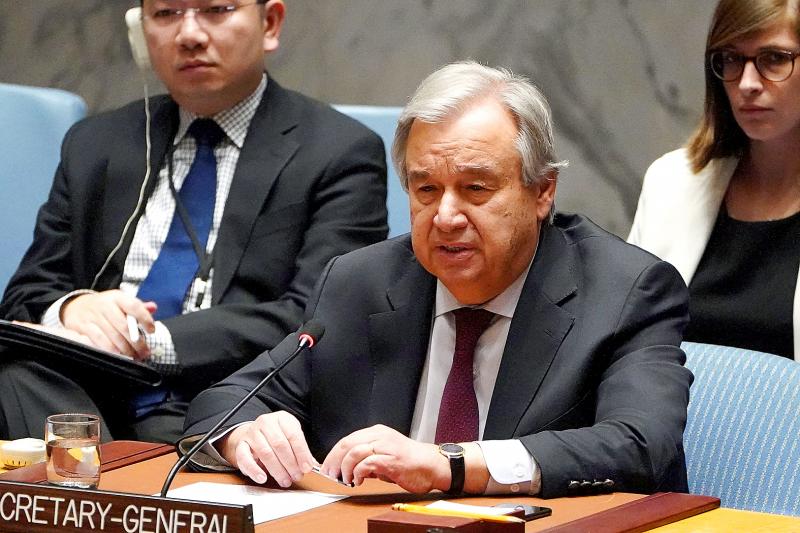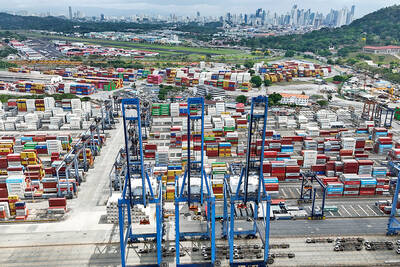For nearly a decade, the UN Security Council has been frequently paralyzed by Russia’s obstinacy over the Syrian crisis. Today, however, it is the US-China rivalry that has infected a growing array of issues, according to officials and diplomats.
As recently as 2017, an understanding between Washington and Beijing allowed the UN on three occasions — involving separate sets of economic sanctions — to project international unity in the face of the North Korean nuclear threat.
Three years later, the COVID-19 pandemic has seen a ferocious competition erupt between the UN’s two main contributors, prompting UN Secretary-General Antonio Guterres on May 1 to bemoan a “lack of leadership” during the world’s worst crisis since 1945.

Photo: Reuters
“Where we see power, we sometimes do not see the necessary leadership,” he said.
Even after more than two months of negotiations, the 15 Security Council members were unable to reach agreement on a resolution supporting a call from the UN secretary-general for a global ceasefire while the world battles the novel coronavirus.
The sole reason?
US-Chinese differences over a passing mention in the draft resolution to the WHO, with which US President Donald Trump on Friday said he planned to sever ties.
UN officials and diplomats say the US-Chinese conflict seems to be spreading, leaving them increasingly pessimistic.
“The Security Council has been frozen for 45 years between 1945 and 1990, because of the Cold War,” one ambassador said, speaking on condition of anonymity. “The last thing we need is another Cold War that would freeze again the Security Council.”
“Importing bilateral disputes in the council would be a disaster,” he said.
Another ambassador added: “We really shouldn’t enter in a new Cold War, but it doesn’t look very good at the moment,” whether regarding leadership, the pandemic or US-Chinese relations, three subjects “very closely tied to each other.”
At the UN, there is a sense of a dangerous drift into new and dysfunctional territory.
“In the past, when you had disagreements among members of the council, it was compartmentalized,” said a UN official, speaking on grounds of anonymity. “So your adversary one day on a particular issue was your best ally the next day on another issue. What we see now is everything spilling over.”
“So there are camps, or there are disagreements which just spill over from one issue to another,” the official said, clearly alluding to the situation in Hong Kong, where tough new Chinese security legislation has the US and China against each other.
“The tensions between the US and China are really problematic” for the world body, meaning the Security Council is “not able to move forward on a range of things,” the official added.
Several ambassadors shared that view.
“There is a huge fracture in the global multilateral architecture right now. And it’s very serious,” EU Ambassador to the UN Olof Skoog said.
“We are witnessing a polarization in the Security Council,” said German Ambassador Christoph Heusgen, whose nation is currently a non-permanent member of the council, alluding to an ever more bitter volley of tweets being exchanged by the US and Chinese missions.
At a news conference on Thursday, Guterres expressed his regret that the pandemic had not evoked a greater sense of humility from the big powers.
“If the present crisis shows something, it is our fragility. Collective fragility. When we are fragile, we should be humble. When we are humble, we should be united and in solidarity,” he said after a high-level UN meeting on how to handle the pandemic’s economic fallout, in remarks that were clearly directed to members of the Security Council.
He then made it abundantly clear that he had in mind the US and China — which as permanent council members enjoy the veto power that greatly magnifies their influence.
“I have never seen the council’s work being paralyzed by [non-permanent] members,” Guterres said.

THE TRAGEDY OF PUNCH: Footage of the seven-month-old Japanese macaque has gone viral online after he was rejected by his mother and formed a bond with a soft toy A baby monkey in Japan has captured hearts around the world after videos of him being bullied by other monkeys and rejected by his mother went viral last week. Punch, a Japanese macaque, was born in July last year at Ichikawa City Zoo. He has drawn international attention after zookeepers gave him a stuffed orangutan toy after he was abandoned by his mother. Without maternal guidance to help him integrate, Punch has turned to the toy for comfort. He has been filmed multiple times being dragged and chased by older Japanese macaques inside the enclosure. Early clips showed him wandering alone with

Australian Prime Minister Anthony Albanese yesterday said he did not take his security for granted, after he was evacuated from his residence for several hours following a bomb threat sent to a Chinese dance group. Albanese was evacuated from his Canberra residence late on Tuesday following the threat, and returned a few hours later after nothing suspicious was found. The bomb scare was among several e-mails threatening Albanese sent to a representative of Shen Yun, a classical Chinese dance troupe banned in China that is due to perform in Australia this month, a spokesperson for the group said in a statement. The e-mail

TENSIONS: The march went ahead without clashes, but arrests were still possible as police investigate suspects behind Nazi salutes, racist slurs and homophobic insults Thousands of people on Saturday marched in southeastern France under heavy security in tribute to a far-right activist whose killing, blamed on the hard left, has put the country on edge. The crowd — many wearing black and some covering their lower faces with masks — marched through the city of Lyon carrying flowers and placards bearing pictures of Quentin Deranque and the words: “justice for Quentin” and “the extreme left kills.” The 23-year-old died from head injuries following clashes between radical left and far-right supporters on the sidelines of a demonstration against a politician from the left-wing France Unbowed

‘OCCUPATION’: Hong Kong said it had lodged ‘stern protests’ with Panama’s consulate, and would ‘staunchly support’ the rights and interests of Hong Kong companies Panamanian President Jose Raul Mulino on Monday ordered the temporary occupation of two ports run by a unit of CK Hutchison Holdings Ltd following the Supreme Court’s ruling against the firm’s concession, escalating a dispute that has become a proxy battle between the US and China in Latin America. Mulino said in a speech that the administration and operation of the two ports on the strategic Panama Canal is to revert to the country’s National Maritime Authority to ensure their uninterrupted, safe and efficient operation. The occupation covers movable equipment at the ports and does not mean a definitive loss of